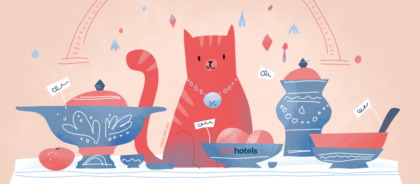Taste the offerings: you are not obliged to buy them
Anybody who has been to Istanbul at least once knows: if you aimlessly walk around the Egyptian Bazaar, you will never find a seat for tea and baklava, even if you set off for Safa with that very aim.
You will be offered diverse confectionery, dry fruit, and aromatic tea at just about every stall there. This doesn’t mean that you have to give in to buying something from the friendly shop-keeper: simply smile, thank them, and engage in a bit of small talk. Nobody will grab your hands and force you to make a purchase.
This rule extends not only to confectionery and nuts: here you will be able to try almost anything for sale, be that spring strawberries, cheese, nut butter, or other delicacies.

You will be offered a variety of sweets, dried fruits, and aromatic tea to try in almost every shop selling them. Photo by: Ihor Bondarenko / Shutterstock.com
Bazaars that would be a crime to miss
Egyptian Bazaar, Istanbul — 88 little shops that offer a sea of confectionery, spices, teas and nuts, as well as several stalls with ceramics and silk.
Koza Han, Bursa — heaven on Earth for lovers of silk. Walk through the five-hundred-year-old caravanserai, buy the most beautiful yet inexpensive headscarves palatines, and neck scarves, then drink coffee in the cozy internal courtyard — and conclude that this is what happiness really is, it’s at your fingertips, just hiding in the folds of the softest silk.
Arasta Bazaar, Istanbul — this quiet market alley behind the Blue Mosque will be appreciated by those who dislike crowds and bustle: you can even spend 20 minutes choosing a magnet if you so wish, and the seller won’t be breathing over your shoulder, and giving you unwanted recommendations. Here you can purchase jewelry, ceramics, rugs, textiles, souvenirs, confectionery tea, and spices, while at the same time visiting the Great Palace Mosaics Museum located at the site of the Great Palace of Constantinople.
Grand Bazaar, Istanbul — a market city within a city, comprising 4,400 stalls. It has its own mosques, fountains, restaurants, hotels, currency exchange services, and even a cemetery, but it’s awfully easy to get lost while chasing after treasures. Here, they mostly sell jewelry leather goods, textiles, rugs, ceramics, and souvenirs. Maps of the bazaar are provided inside to make it easier to get around. Don’t forget to take a look at the arched ceilings — some of them are incredibly pretty.
Learn a couple of phrases in Turkish
Turkish people are delighted when tourists attempt to speak in the local language, and will explain with pleasure the meaning and pronunciation of words that are new to you. For example, by the time I had reached the end of the first row at the Egyptian Bazaar, I had already added several words to my modest vocabulary that until then comprised just five words. Admittedly, the exuberant Turkish greetings, together with my facial features that closely resemble those of the locals, often leads to the conversation continuing in Turkish.
It’s no tragedy: you can always apologize in English.
Minimum Turkish for tourists
Here are several phrases that will help you to win the hearts of vendors at the bazaar, in the shops and cafes. They will guarantee you a smile and, perhaps, a decent discount. Clever use of this rather unsophisticated vocab list will help you to travel comfortably even across the Turkish provinces, where English is not as widespread as in Istanbul or Antalya.
- Merhaba [mɛrˈhɑːbɑː] — Hello;
- Teşekkür [teʃɛkˈkuɾ] — Thank you;
- Lütfen [Lutfɛn] — Please;
- Güle güle [ɡylɛ ɡylɛ] — Goodbye;
- Hesap [hɛsap] — Check;
- Hesap lütfen [hɛsap lütfɛn] — Can I have the check, please?;
- Bir [Bir] — One;
- İki [İki] —Two;
- Nar suyu [naɾ suju] — Pomegranate juice;
- İki portakal suyu lütfen [iki poɾtakal suju lütfɛn]— Two orange juices, please.
Don’t be shy to speak just because you’re uncertain about the correct pronunciation — they will correct you with a smile and tell you how to pronounce the word or phrase correctly.
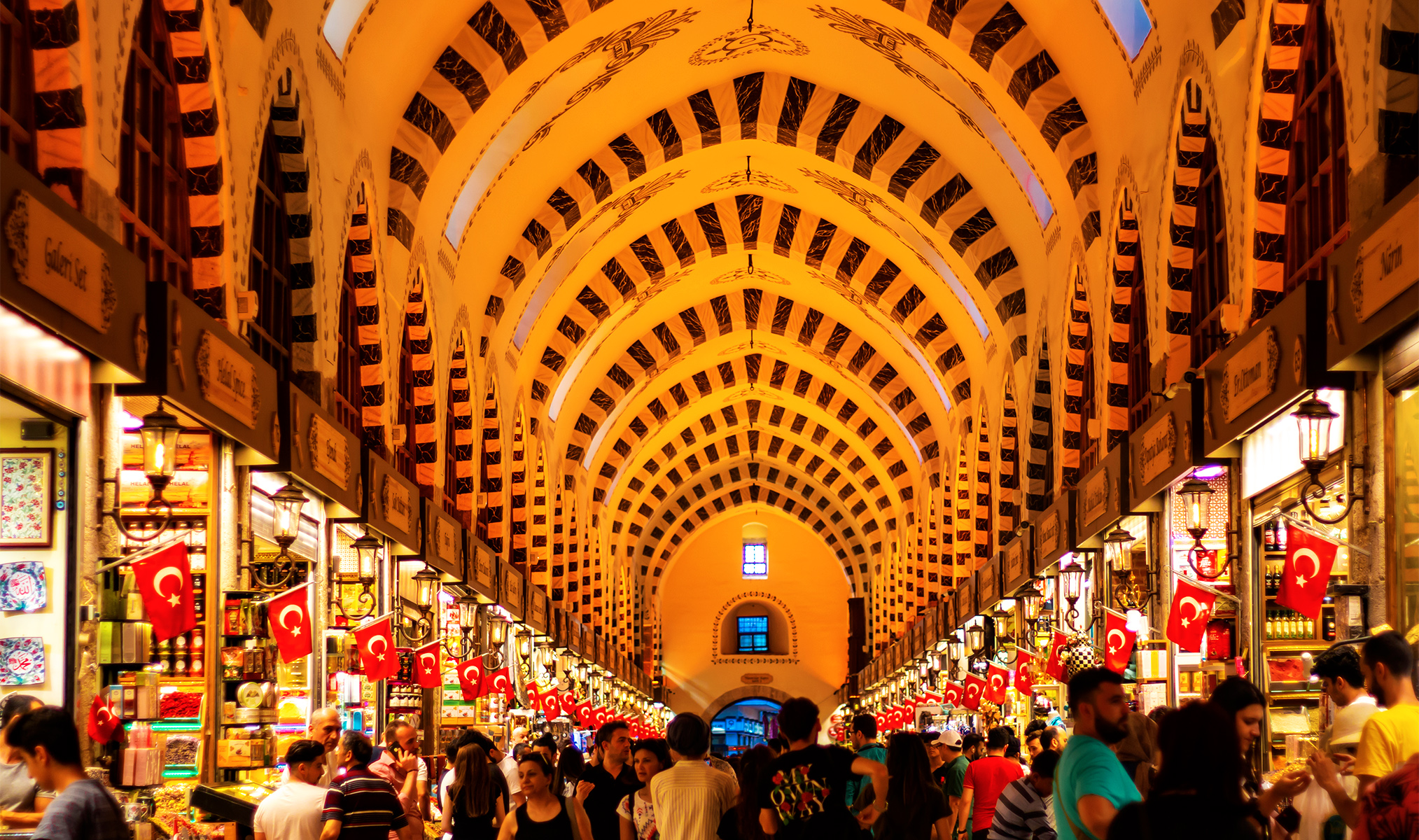
Don’t hesitate to speak, even if you’re unsure of the pronunciation – people will gladly correct you with a smile and help you with how to pronounce a word or phrase correctly. Photo by: TheTuna / Shutterstock.com
Haggle
This does not offend the seller, and nor does it demonstrate that your budget is limited. Rather, it’s a fun process for both parties.
Haggling at the market is a subtle art that brightens up everyday life. Dozens of the finest silk scarves fly in the air, while multi-colored piles of tender cashmere adorn the shop windows; examples of handiwork contrast with cheap Chinese materials, and the sellers from neighboring stalls come to help make a sale. They search for the color combination you need throughout the market and, my God!, the battle is finally won, everybody is happy, and it’s time to start wrapping the item. Instead of the one headscarf you planned to buy, you cautiously clasp three to your chest, and the seller gently shows two cardinally different prices on the calculator: the lower one is your price including your hard-earned discount, come and visit us again soon.
This rule applies only to markets, bazaars and similar places; haggling is not done in places with fixed prices, such as in restaurants, shopping centers or pharmacies.
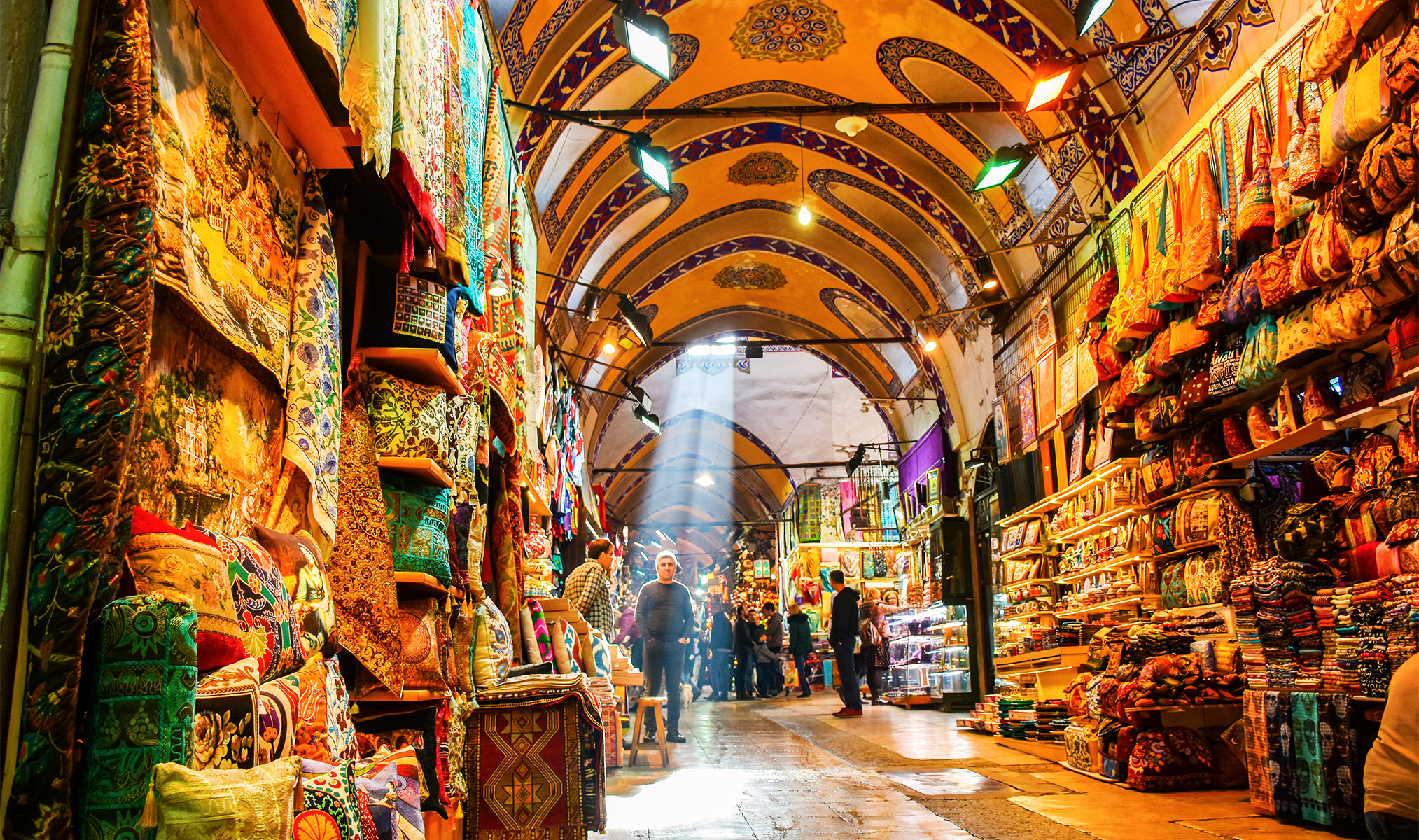
Haggling at the market is a subtle art that brightens up everyday life. Photo by: Tekkol / Shutterstock.com
Investigate the subterranean floors
Not many tourists know that many stalls at, for example, the Egyptian bazaar, have lower, underground floors. They are mostly used as storage or auxiliary premises, but for some stalls, especially those selling ceramics, they also display goods. As a rule, there are no people there, and you can peacefully choose tiles and plates without noise and hassle after just greeting the seller in advance.
The only disadvantage of these Aladdin’s caves with genuine treasures is their stuffiness, but there’s nothing you can do about that: 350 years ago there were no air conditioners, so the architects didn’t include them in their plans., in this subterranean world you can spend as long as you like choosing between two items of cini, and nobody will be nudging your elbow.
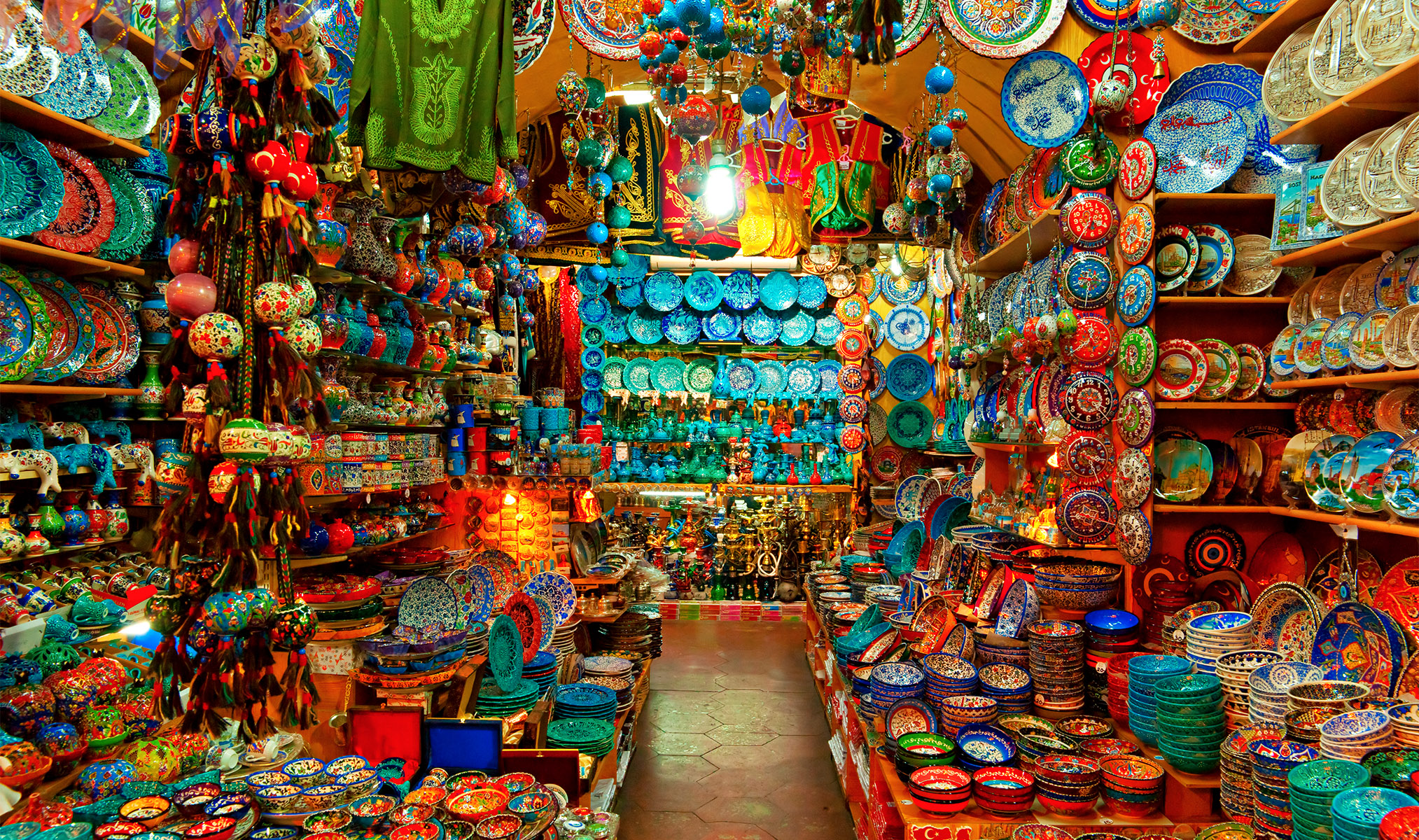
Usually, there are no people on the lower floors, and you can peacefully choose tiles and plates without noise and hassle after greeting the seller. Photo by: Luciano Mortula – LGM /Shutterstock.com
Must buys: what you should bring home from a Turkish market
On the surface this seems a rather easy question, but it really depends on your geography. Bring home something that isn’t available in your region which will delight yourself and your nearest and dearest: confectionery from Turkish delight to baklava (in Istanbul you will find wonderful baklava in the Hafiz Mustafa chain of shops, ask them to vacuum wrap it), Iznik ceramics and silk, Turkish coffee and drinking glasses in the shape of tulips, rugs for cats, spices, tea roses and everything that the heart desires … We really do understand that it’s hard to restrain yourself. Above all, keep in mind the dimensions of your suitcases and hand luggage. (for any other occasion you can order delivery.)
Smile and make jokes
You’ll get nowhere in oriental trading without a smile, while a harmless joke will raise the mood of both buyer and seller. At the same time, it’s a great way to make useful acquaintances: while I was buying pistachios, during the conversation I was not only treated to confectionery and three types of tea but, after I was wowed by a decorative mosaic with the Gaziantep Gypsy girl. When I stated out loud my plans to visit Gaziantep at some point in the future, I was invited to their house. They promised that the stall owner’s mother would bake her special pie. They gave me the address and showered me with presents. Moreover, I didn’t exactly leave a small fortune at the stall; I just took a few things to try.
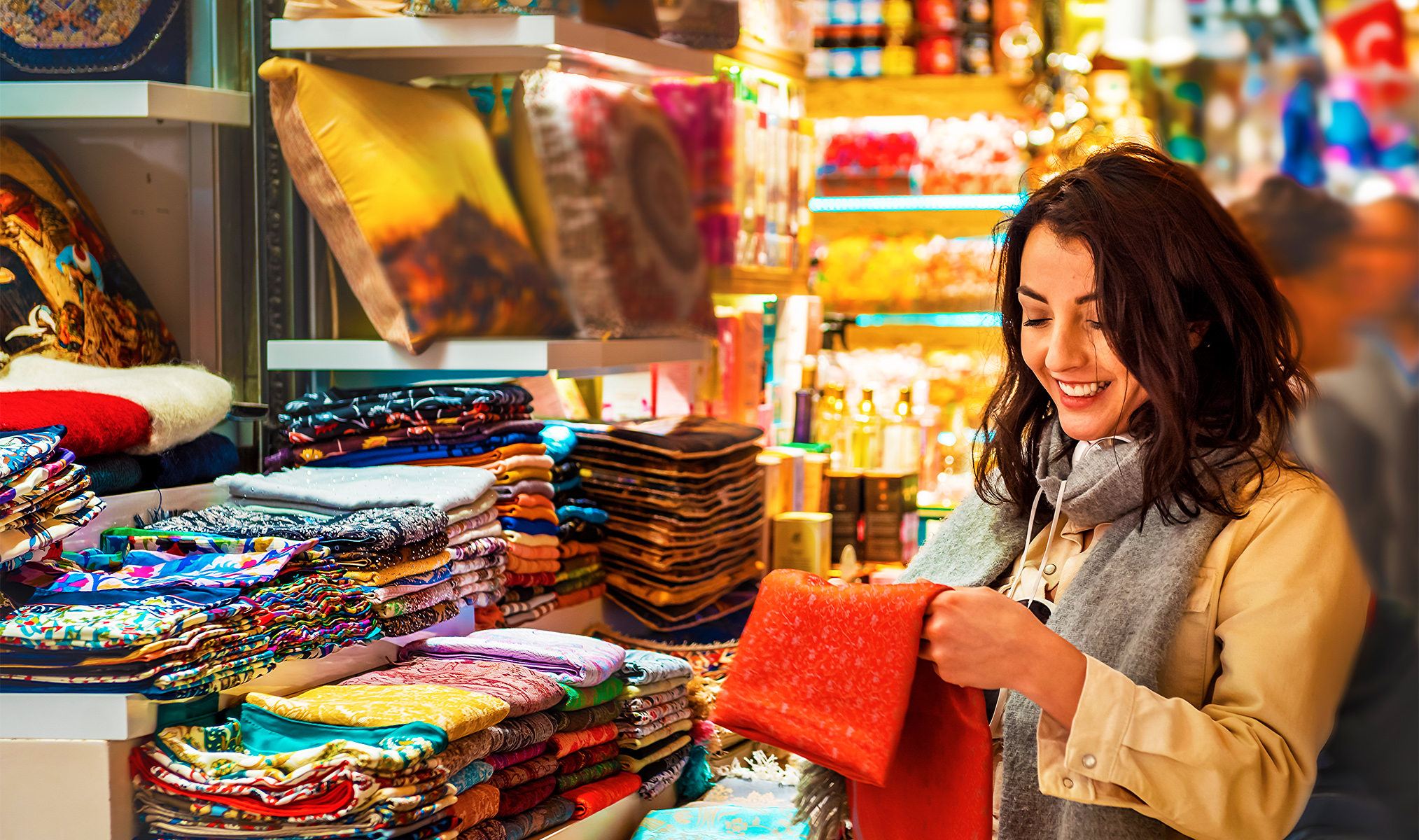
You’ll get nowhere in oriental trading without a smile, while a harmless joke will raise the mood of both buyer and seller. Photo by: epic_images / Shutterstock.com
Now you can set off fully prepared for the enticing markets of Istanbul, Antalya, and other cities of blessed Turkey. See you at the bazaars and hans!

